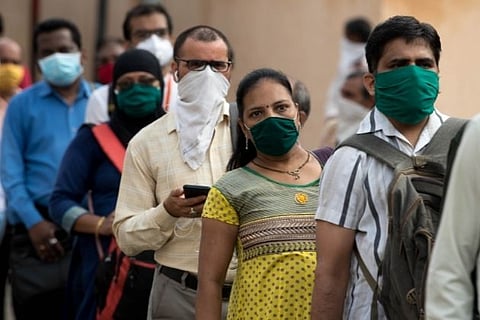Masks have been the most striking lifestyle change that the coronavirus pandemic brought along. The importance of masks since day one of the virus outbreak has been reiterated by and by. Wearing masks, when in closer proximity with someone else, is imperative to stop the quick spread of the virus. Especially with the highly-infectious Omicron variant coming to the scene, the importance of masks has doubled than before. N95, cloth masks, smart masks, surgical masks and what not, masks have gone up to add to our style statement lately. Also, do not forget, masks prevent your contaminated hands from directly touching your nose and face, and that could also help in curbing the spread of the virus. And it’s a valuable addition to our regular hygiene.
Omicron Scare | When Are Masks Compulsory For You To Wear?
Two years on with the coronavirus pandemic, and we still find ourselves lost amid the pool of information on masks. Let’s begin with, when are masks compulsory?
However, with the onset of the pandemic, there has been a lot of conversation, arguments and counter-arguments around which masks are most effective, who should be wearing
masks and under what circumstances.
Two years on with the pandemic, and we still find ourselves lost amid the pool of information on masks. Here are some pointers.
In which situations are masking compulsory?
1. For caregivers inside the house, wearing masks is a must. People, who are residing with Covid-19 patients, inside a close space, should always wear three-layered masks as this practice will prevent them from contracting the disease in close proximity.
2. Everyone above the age of two should be wearing a mask, especially when stepping outside their homes and in crowded places. Additionally, if they can also wear masks inside their houses, it’s always an added benefit.
3. If a person is not fully vaccinated, then wearing masks is a must for them. Without receiving both doses of the Covid-19 vaccination, the chances of being infected with the virus are always higher. Similarly, if you are in close contact with a person, who is partially vaccinated, wearing your mask is imperative.
4. When a person is stepping into a containment zone, the need to wear a mask doubles. In the containment zone, the increased number of Covid-19 infections create a high risk of the virus spreading quickly.
5. People who have a condition or are taking medications that weaken their immune system may not be fully protected even if they are fully vaccinated. They should continue to take all the precautions and keep wearing masks.

Credit: Shutterstock
People with disabilities, how should they prioritise wearing masks?
People with certain disabilities should always seek medical expertise and guidance when it comes to wearing masks. For people, who cannot safely wear and remove masks, consider continuous supervision in ensuring that the masks are fitted properly on their faces and removed before they go off to sleep. It must also be ensured, that they do not touch their face and nose directly while trying to adjust a mask. Excess saliva due to drooling should not be present on the masks.
For certain people, being sensitive to the fabric on faces, having respiratory diseases, wearing masks could be challenging. In that case, medical intervention is a must.

Credit: Shutterstock
What are the most effective masks? All the debate around it.
Research around what is the most effective mask continues to date. With revised guidelines for usage of masks, according to most studies N95 masks are most effective to prevent the coronavirus.
Even before the pandemic, N95 masks have been predominantly used in the healthcare sector to achieve highly efficient filtration against airborne particles. However, as the virus evolves each year, most experts have advocated for the widespread use of N95 for the general populace.
With N95 masks come, the K95 masks. The use of KN95 or N95 masks is recommended by experts as they are better equipped with preventing tiny particles from getting into the nose or mouth. These masks, however, must be fitted to the face to function properly.
Cloth and surgical masks often offer patchy coverage as they may not fit well. In case a mask, even ones made of appropriate material, do not fit well, the wearer is at risk of inhaling viral particles.

Credit: Shutterstock
A recent study analysed 20 different types of cloth masks to detect their efficiency, The study found that the pore sizes of the masks ranged from 80-500 micrometres as against the novel coronavirus which is about 0.12 micrometres. This meant that tiny droplets can be inhaled through the voids or gaps near the nose and cheeks. Cloth masks are not cut for Omicron!
On the other hand, while surgical masks are said to be better than cloth masks, experts suggest that they still lack protection against the Omicron variant.
A large quantity of inferior quality or untested masks is presently available in the market. when purchasing masks, ensure to check the approval ratings of the mask. Avoid purchasing unsealed or unpackaged masks.
Tags